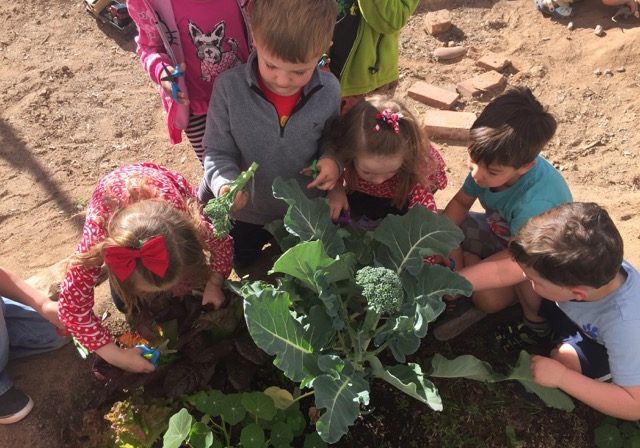written by Jenny Limburg, Toddler 2s teacher
“Mary, Mary, quite contrary, how does your garden grow?” The week we’ve all been anxiously awaiting has arrived: planting week. The weather has cooled down, our seeds have arrived, and the soil has been prepared. With packets of seeds and colored popsicle sticks, our toddler class made our way to the garden. Our garden is part organization, part chaos. As teachers make rows in the dirt, the children throw seeds in every direction. Our garden is labeled, but nothing is more fun than finding a pumpkin vine sprouting in the carrot row. Even more exciting is seeing an odd looking plant sprout up and not knowing what it is. The only way to find out is to wait for the little seedling to reveal itself. We planted a large variety of seeds including: pumpkins, cucumbers, kale, tomatoes, carrots, onions, sweet peppers, flowers, and snap peas. As teachers, we’re especially looking forward to the purple cauliflower, golden beets, and peppermint stick celery (which is supposed to be pink!)
There is something so magical about gardening. To plant a tiny little seed in the dirt and grow a plant is nothing short of miraculous to me. The children are just as amazed. We try to involve our class in each decision. We show them fruits and vegetables and ask them what they’d like to grow. Some seed requests included pumpkins, tomatoes, and even trucks! When our seed packets arrived, we excitedly compared all the different sizes. Planting seeds is fun, but watering is when the party begins. Armed with ten watering cans, our little seeds are lovingly drowned. It’s as if the little seeds know that being patient is very difficult for a toddler because they all popped up over the weekend and we have a garden full of beautiful little sprouts. Each morning, curious toddlers run to their garden to see how the plants change and grow. Even the pickiest eater can’t help but take a bite out of a carrot that they pulled out of the ground. As we start harvesting, we’ll incorporate our garden produce into our cooking activities.
According to a journal article in HortTechnology, school gardens
- significantly increase science achievement scores.
- improve social skills and behavior.
- improve environmental attitudes.
- instill appreciation and respect for nature that lasts into adulthood.
- improve life skills, including working with groups and self-understanding
- increase interest in and attitude towards eating fruits and vegetables.
I can’t help but make a correlation between our newly planted seeds and our little toddlers. As we nurture and love them, they sprout and continue to grow. “Children are like seeds planted in the ground…they must be watered daily. With constant care and attention, the seed will grow to a plant and eventually flower.”

